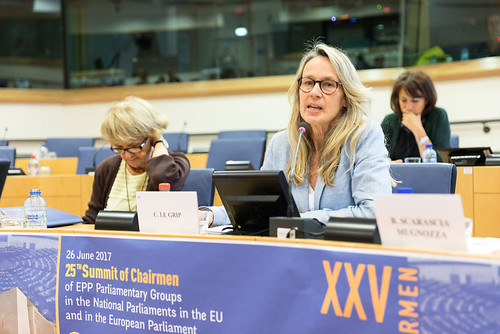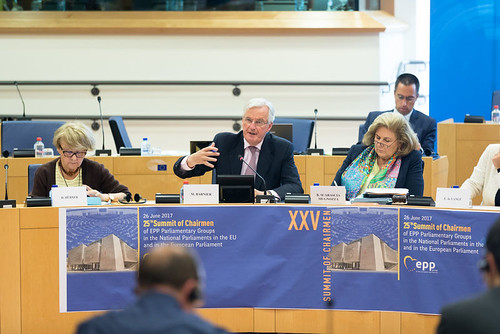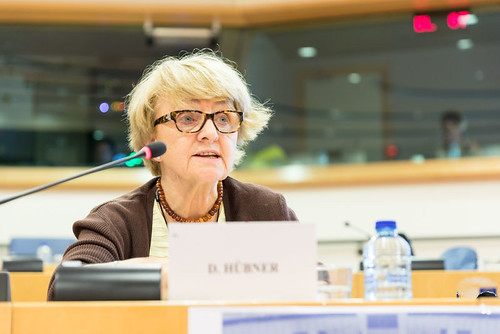Profesor Danuta Hübner właśnie zakończyła wizytę w Waszyngtonie w ramach spotkania Grupy Transatlantyckiej. Od 11 do 15 lipca Sieć Idei Europejskich (European Ideas Network – EIN) we współpracy z Centrum Martensa, Instytutem Hudsona oraz Instytutem Republikańskim (IRI) zorganizowała robocze spotkania Grupy Transatlantyckiej. Sieć Idei Europejskich to think tank EuropejskiejPartii Ludowej promujący nowy sposób myślenia o głównych wyzwaniach stojących przed krajami.
W czasie dni roboczych eurodeputowani spotkali się z amerykańskimi politykami w Kongresie, aby dyskutować na następujące tematy: migracja, stosunki handlowe między UE a USA, terroryzm w Europie i w Stanach Zjednoczonych, przyszłość NATO. Delegacja spotkała się także z przedstawicielami Pentagonu, aby rozmawiać o bezpieczeństwie transatlantyckim. Następnie w Instytucie Republikańskim (IRI)odbyła się dyskusja na temat wyborów prezydenckich w Stanach Zjednoczonych oraz ich wpływu na stosunki z Europą.
15 lipca Profesor Danuta Hübner była głównym panelistą dyskusji w Instytucie Hudsona na temat stosunków między Stanami Zjednoczonymi, Unią Europejską oraz Rosją.Oto tekst wystąpienia Profesor Danuty Hübner w ramach tego panelu:
„The topic justifies making a step backward and ask the question whether the Union could have done more to be today, in the current global context, in a different relationship with Russia. There is a history of EU Russia relationship which, in my view, facilitated President Putin’s moves. Our relations went wrong for years.
You might remember how naïve we were talking with Mr Jelcyn, hoping to see Russia sharing our values, respecting international laws, be friendly. We invited Russia to G7.
When in 2007 the old partnership agreement expired, it became clear that Russia had no interest in negotiating a new one. Mr Putin followed his logic of zero sum game, where Russia could be safe only if we were not. He was ready to enter into deals which gave him a winning result which he could use at home. We did not do enough to break his logic. Also, for years the US Russian agenda was different from the European one. For US Russia mattered in the global context, for Europe it was more about bilateral relations. In short, we did not have CFSP, we did not have the CSDP, we did not have either a political leadership on Russia. Weimar triangle could be used to bring more unity on Russia. V4 group of new member states could have added to the content and unity in EU Russian policy. This did not happen.
We have failed completely on our ambition to transform Russia into a liberal democracy, to make Russia a partner sharing values and respecting law. From a strategic partner Russia moved toward being more a problem, a challenge, and today it is on our list of those with whom we need strategic cooperation. What seems clear is that the twenty eight member states of the Union are united by having no appetite for conflict with Russia. However, there is not really much space for effective dialogue with Russia in a way that would accommodate Russia and allow for cooperation while safeguarding our interests.
For years, Russia is an elephant in the room during many meetings across Europe, within EU and NATO structures. Last NATO summit in Warsaw is an example of such a meeting. While we clearly do. It have 28 national position on everything that relates to Russia, I cannot say we are united in our European position. I am not sure either whether we are prepared as individual states to fully channel this relationship through EU and NATO. Next round of decision on sanctions will be a test. Did we have another option than sanctions when Mr Putin invaded Ukraine. I do not think so. Could we abandon Minsk when we realized that it was from the beginning compromised by Russians? I do not think so. That was the only Minsk we had.
What now? There is not much of a good news. Ukraine will remain a frozen conflict, similar to Cyprus, Moldova, NagornyKarabach or Abchazja. On annexation of Crimea we don’t even talk anymore. Demographic trends will decide in twenty thirty years. The Tatar population will dominate and what will be on political agenda there will be independence rather than return to Ukraine. On Minsk I am very sceptical. It will never be implemented. We will have to find out the way of decoupling sanctions from its implementation. I cannot believe that President Poroszenko might agree to a special status of Donbas. I can only hope that we will not force Ukraine to give up on it in the context of visa liberalization. With regard to political change in Russia, any new peaceful solution seems unlikely. There is no chance for a revolution either. So we, both EU and NATO will continue the double track, looking for solutions between a dialogue and investment in defence capacity. Let us hope that President Putin will. To succeed in dividing NATO members.
To conclude, a word on EU US relations in the Russian context. My impression is that US has seen Russian threat in Europe as an important argument in favour of a new type of structural, partnership with Europe. That is a good news. But will this strategic new normal last if, what is unlikely, Minsk is implemented? Have we, EU and US, managed to recapture Putin’s agenda or are we just helping Putin to get a new deal with the west and offering him a face saving exercise?”







 Przejdź do kalendarza
Przejdź do kalendarza






